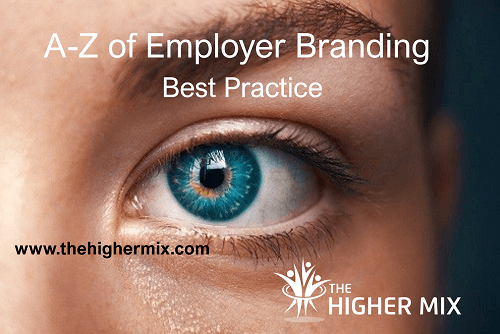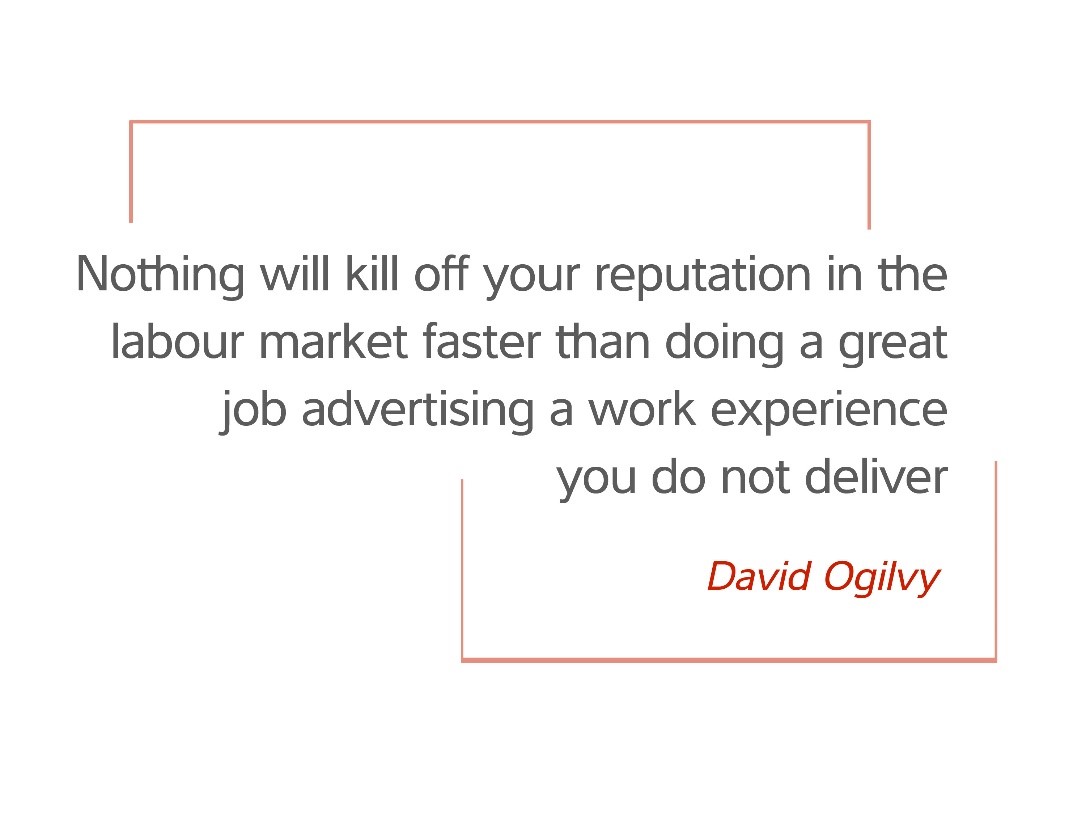What is Employer Branding?
In simplest of terms, it is the identifiable, unique employer identity (value concept) behind your organisation, and potential it has as employer - both of which differentiate it from competitors.
An assurance of the employment experience | brand promise making it far easier (cheaper) for your organisation to attract the quality talent who'll perform best and thrive in your culture.
Employer branding favours businesses endeavouring to attract and retain great people with diverse experiences, skill-sets and ways of thinking. Consistency, appropriate messaging externally and resources to more effectively manage staff expectations, drive accountability, collaboration and advocacy internally.
Why Employer Branding is so important?
Every company wants to attract specific types of talent, people with skills (and fit) who will stay productive and engaged in their environment and culture. Stark reality today though is many organisations struggle in their attempt to be truly different from competitors, to find necessary efficiencies, for some, that difficulty extends to even trying to stay abreast of effective (relevant) talent acquisition practices.
There’s a strong business case to introducing clear, compelling Employer Brand (EVP) into any organisation. Harvard Business Review demonstrates this in their Blog Why CEO’s need to take Employer Brand seriously – basically translates into your organisation becoming more competitive | winning in talent markets.
Finally, employer brand hits its straps. Recognizable ability to unlock enormous economic potential and future growth, only if the brand is constructed strategically; i.e is focused upon developing resource capabilities company-wide; beyond just attracting talent, to the retention and engagement of your existing good people, in the process.
Talking about a vital talent management tool here…
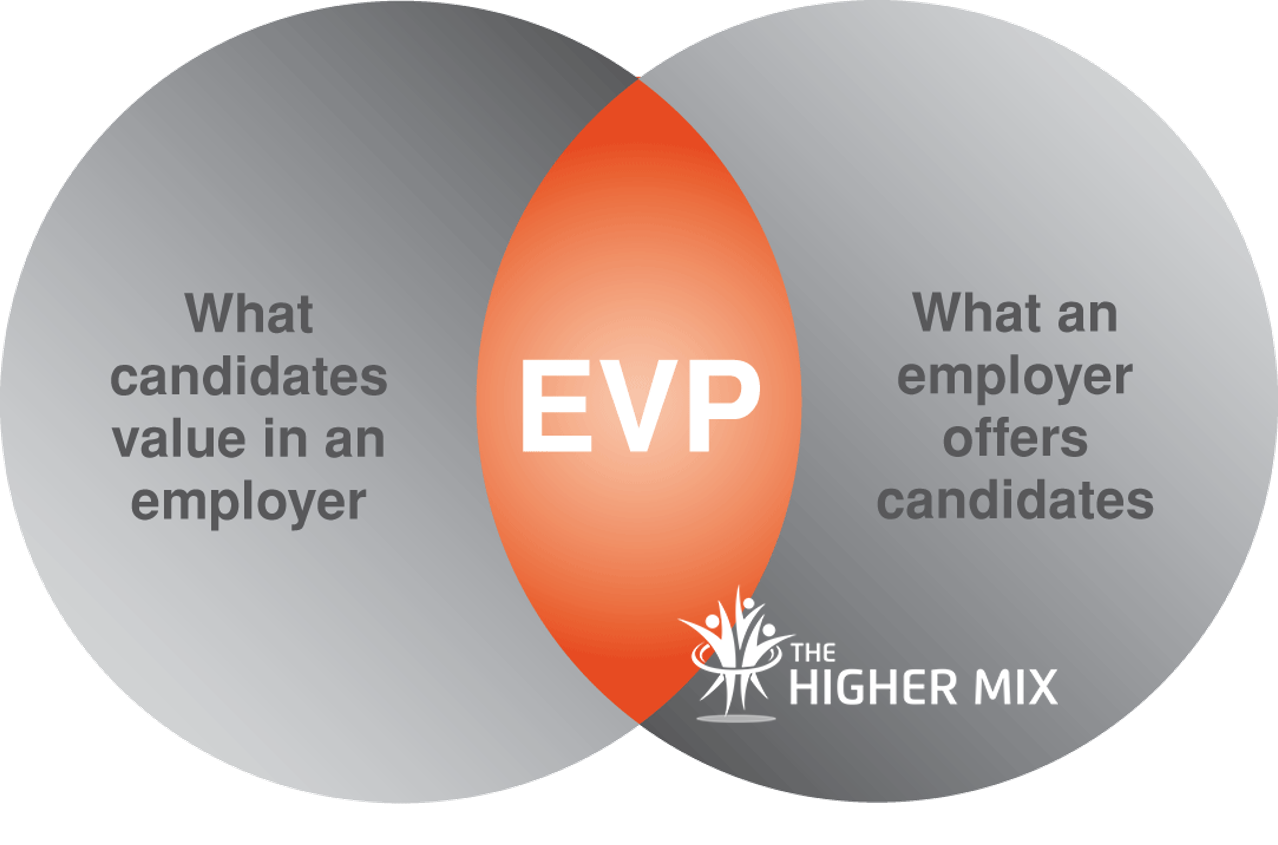
EVP enhances change, impacts on entire employment experience, positively affecting people’s motivation, engagement levels and wider organizational culture at the same time. Again, only if your employer brand strategy is crafted and executed properly.
QUEST FOR SKILLED TALENT, PROMINENCE AND APPEAL
Employee propositions differentiate organisations from their competitors, but end-to-end strategic employer brand programs involve much more.
Deep dialogue and engagement directly with key stakeholders, facilitated learning experiences through various functions, levels of a business, calibration of performance levels in direction of competitive norms, and support for different talent strategies (also correlates significantly to cross-cultural and gender diversity, longevity in the workplace, ageing workforce considerations and specifically, new ways of working etc).
Companies of all maturity levels are running with the incredible value (and opportunities) employer branding best practice brings; improving their capacity to attract, retain and engage great talent in today’s new economy. Knowledge, technology and niche skill-sets are competitive enablers – shortages only hamper organisational efforts, obstruct strategy delivery, and/or render delay – further straining economic growth and affecting the bottom lines.
Sometimes even posing significant threat to an organisation’s sustainability too – as is the case, right now, for a good many companies.
[thrive_link color=’purple’ link=’mailto:jo@thehighermix.com’ target=’_self’ size=’small’ align=’right’] CONTACT OUR EMPLOYER BRAND SPECIALISTS[/thrive_link]
Employer and company branding drives presence in markets, enhancing the ability to win over talent and to be considered an employer of choice. Internally, strong, strategic employer brands increase staff retention, reduce recruitment, agency and human capital costs, decrease time to fill and positively impact on the internal culture of your organisation.
Perhaps your business has a great culture already -wanting to see this maintained/ enhanced through growth> Or alternatively, might be mid-way through an ambitious transformation strategy, revising business plans. Or finding market or legislative changes frustrating your retention-recruitment processes/targeting efforts, across national and global markets?
Overcoming such requires faster access to specialised skills, across different sectors & locations.
So if your business looks for more appeal, to make it easier for your teams to attract/retain unique, valuable skill-sets and ultimately, future-proof the business – then look no further than employer branding to help you achieve those outcomes.
Employer of Choice – Much More Than Looking Different
Too many employer brands (and EVPs) are built in boardrooms. Why so many fail to gain traction. With leaders assuming they know employees well enough to be able to speak for them, how they feel, what it is they do actually want.
As employer brand consultants we rely on the evidence.
Adopting strategic employer branding methodologies and an agile approach to mesh all the elements in determination of what organisations should rely on to differentiate itself and drive talent and business goals.
Brand Consistency
Employer brands hinge on mental and physical availability, so organisations have to concentrate on building consistent actions and associations to their own talent, potential candidates and to the marketplace.
By now, we know Employer brands allow organisations to more competitively compete in labour markets, prevailing across all types of market conditions to guide attraction, recruitment, induction, socialization and commitment.
Along with supporting existing HR iterations (organisational development, employee engagement, culture change and much more.)
For these outcomes, process must be elevated above it being “all about attraction” (in spite of some creative agencies who infer they ‘do’ employer branding. what they might have you believe, and subsequently direct both efforts and investment into.)
Regardless of decisions you make; where that focus is put (from employee experience perspective), arrive at it from a place of sound research and authentic feedback from your people.
Employer Brand Relationship to Company Brand
Employer branding methodology involves attention being directed at organisational brand elements too.
Well-articulated employer brands attract the right talent to an organisation, but for this to happen visible alignment between a company brand and employer brand is essential. A company’s brand positioning and appeal is what first captures the attention of prospective talent and moves them into action.
Direct Correlation between Reputation and Employer Brand
Employer branding is synonymous with company reputation, but they aren’t the same thing.
Deliberately nuanced, maintained using a mix of science, creativity and purpose; offering stronger positioning sure, but damage to one also weakens the other.

While often employment-specific and localized, employer brands remain intimately connected with and echoing the company brand, therefore will directly impact on brand identity, internally and externally/ vice versa.
Here’s the kicker too – employer brands are usually only ever as strong as the company brand.
That said, organisations can use one to influence the other.
End-to-end branding means a company’s perceived identity/image and its actual organisational culture and people are one and the same.
Another solid reason for ensuring employer brand development is treated as strategic exercise (well considered and not crafted in isolation.)
Best-Practice Employer Branding Process
Employer brand is a powerful business tool and very much a science meets art approach.
Before examining build process more closely, worth noting employer branding is one of the non-negotiable brand protocols all businesses have to have in place; evidenced in company branding process flow at 3B below. 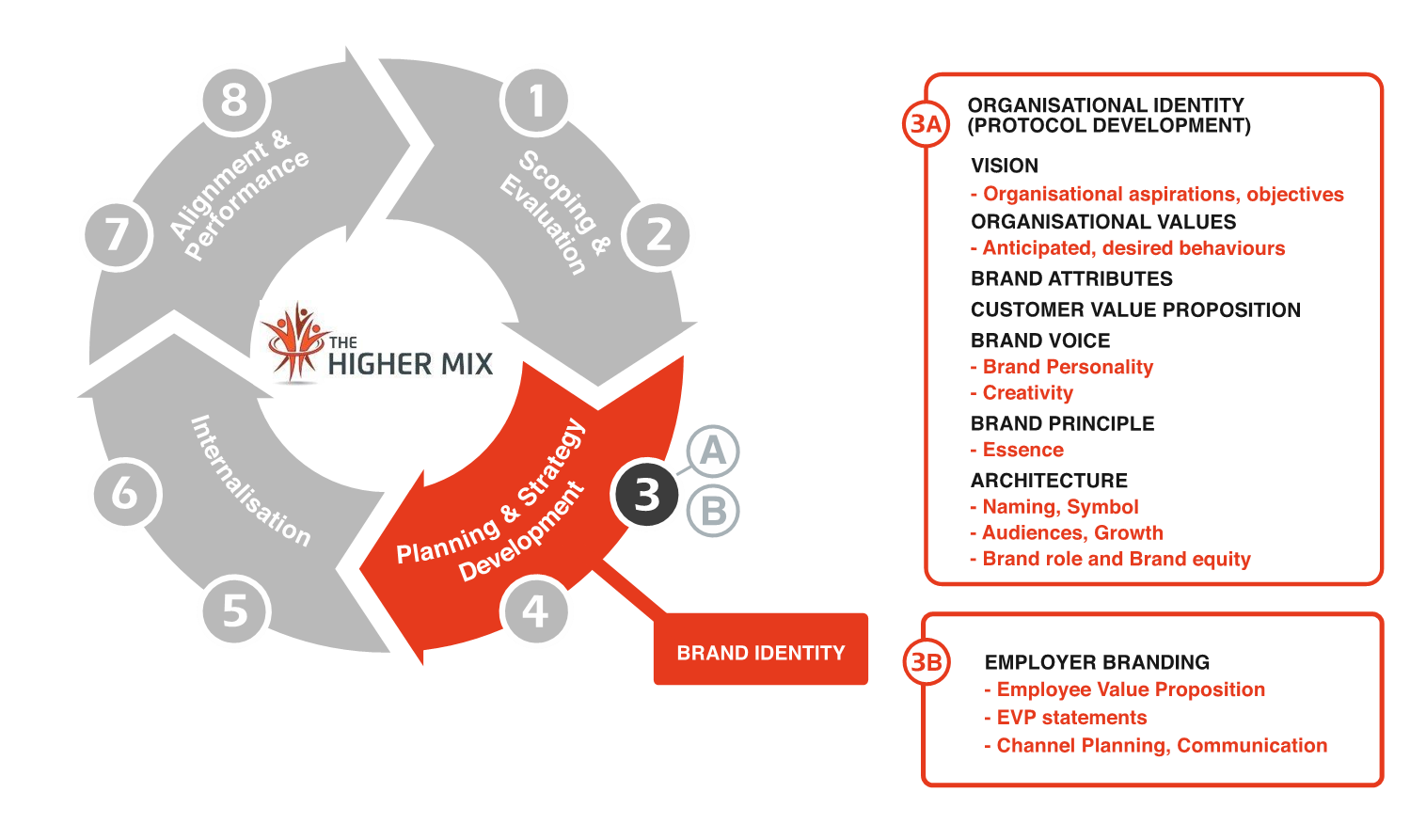
Employer Branding Framework (Simplified)
For your journey to discover how to approach constructing a more powerful employer brand; here’s our scaled-back version of employer brand framework from The Higher Mix, which introduces you to the streamlined phases of a typical EB program: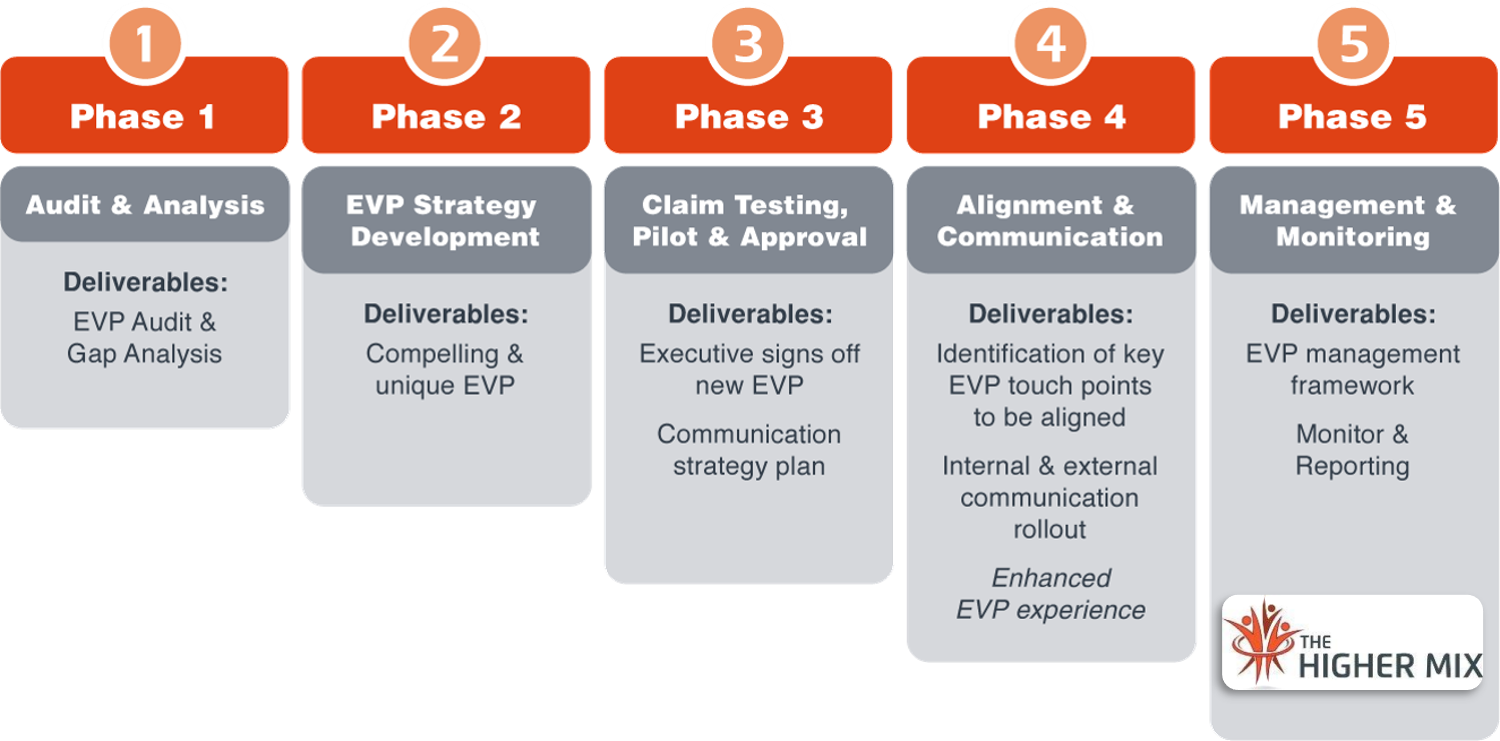
Probably obvious by now; employer branding, done well, is a relatively complex (cultural) process. Demands mid-term view if your business wants employer brand equity, along with the plethora of outcomes discussed in this Blog.
Ok, let’s break an employer branding process further; into its more vital phases and actions.
1. Firstly, Employer Brand is Evidence-Based
Strategically designed EVP relies on specific data, along with qual feedback gathered and analysed, so that the employer brand is believable, authentic and deliverable. Employer brand strategy (and methodology) takes a long hard look at the entirety of the employment experience.
Research uncovers the basis for the EVP, and fosters your employer brand well into the future. Data and information gleaned from all over the business includes:
- Existing Strategies: Brand, Organisation and Talent
- Technology
- Stakeholder inputs: current employees + customers + partners + recruiters
- Labour markets trends/activities
- Competitors (for talent)
2. ‘Whole of Systems’ Approach
While employer brand processes guide companies to more fully understand market perceptions of both brands – employer and company – also gives a baseline to close gaps between what your employees | potential candidates expect and what the organization delivers.
Importance hinges on how your Employer brand supports existing assumptions and dispels myths, bias too. Beyond our concern with workplaces; we pressure-test company brands and reputations as we interview key customers, partners, Recruiters, JV partners etc; for a much deeper evaluation of both candidate and employee experience.
3. Employee Engagement Matters
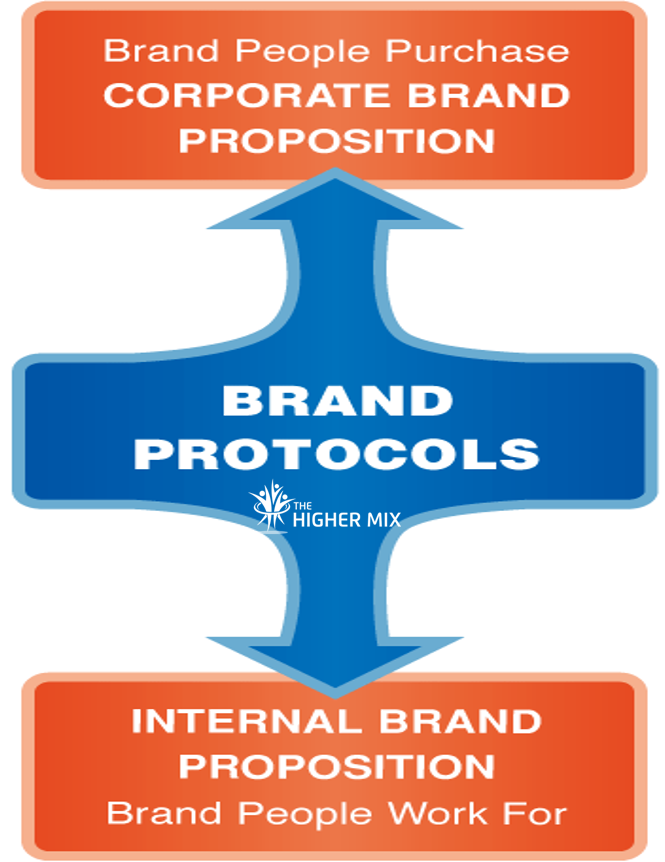
Extending this rigour internally to examine specifics of company culture, engaging your internal teams in the process. Ascertaining just what goes to make your organisation so different? How joined up it is? What’s happening inside it? How people behave? How does the work get done? How are people being managed and developed?
Interesting, when people let down, and talk from the heart about all this – that’s where the real brand resides. Understanding how your employees feel. What is it they truly value in the employment experience, getting their feedback about working with the organisation, dealing with customers and project partners etc? So see this for what it is. A first-class engagement exercise, because a compelling EVP always reflects this sort of positive feedback.
Wider engagement ensues: this time, externally with recruiters and clients – as they too shine a valuable light on servicing, qualities (and shortcomings.)
Environmental scans assess existing labour market expectations, competitor activities; evaluating these helps us to help you get the brand positioning right.
As Employer Brand Strategists, we review and use existing data-sets your company already has also – quantitative data; engagement surveys, employee surveys, focus groups completed, talent analytics etc. Transparently breaking that data down; by area, location, commonalities; also assessing differences/gaps because employer brands need to echo nationally, globally as they go to market.
4. Employee Value Proposition (EVP)
Every organisation has an Employer Brand; consciously developed or not. Every company has the means to evaluate, use what is at their disposal to keep employees happy, the brand appeal high and employment experience strong.
Employee Value Proposition (EVP) is the promise of a total distinctive employment experience; matching distinctive attractiveness to the total workplace experience, considering company values, systems, policies and behaviours, all with ultimate aim of attracting, motivating, retaining existing talent and attracting new team-members.
EVPs are used in many ways – none the least, as a tool for influencing brand appeal (improving business’ profiles as “great places to work”).
EVP strategy informs on how to best manage, where to effectively market those qualities. EVP internalisation with Leaders and influencers ensures it cascades through the entire organisation.
4a. Psychological Contract
Employee Experience Journey Mapping
Any organisation wants to access unique perspectives on strengths, gaps (actionable insights) on talent experiences; as an opportunity also to unite, connect teams, managers, key influencers to achieve deep engagement with them. Informative means to articulate the current state, unfolding brand directions and strengths too. Exploring the psychological contract between employer and employee means we can more fully understand what parties expect to give and get from each other?
4b. Critical EVP Characteristics
In developing Employer brands, of most concern to us (and should be to you) are critical EVP characteristics. Analyzing and understanding what’s adding to or detracting from both the employee experience and culture in organisations.
Team contributions create organisational value and sustainability. So employer brand solutions are therefore best developed with employee life-cycle in mind. Typically, analysing over 44 different attributes of the employee experience – to elicit important opinion on the brand’s differentiation, servicing and operations while we are at it….
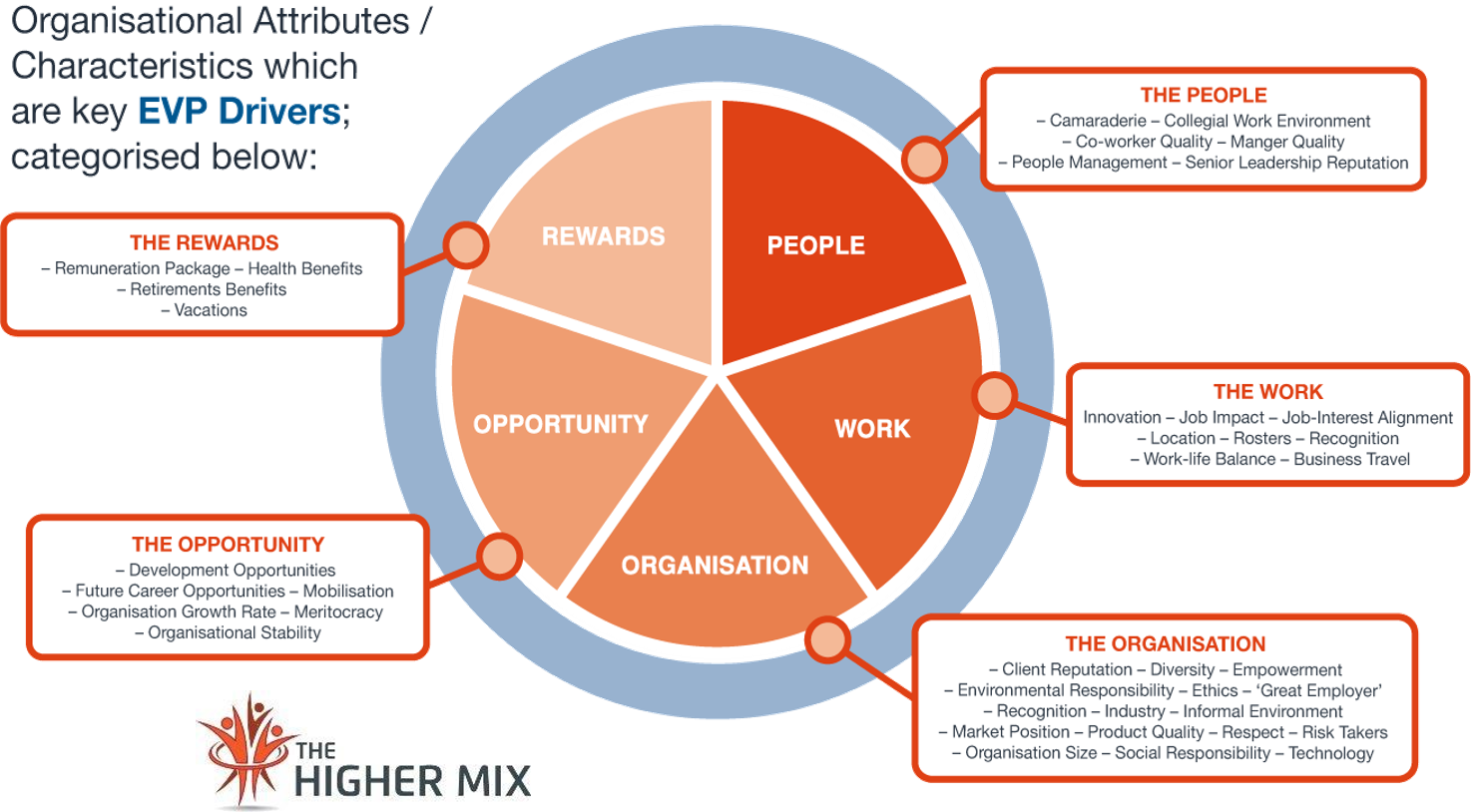
5. Developing EVP Attributes
Critical EVP attributes coupled with the value your company offers its potential talent and existing teams; is tantamount to brand differentiation.
A common mistake we see organizations make through all this? They aren’t strategic enough about the specifics they want to brand and market.
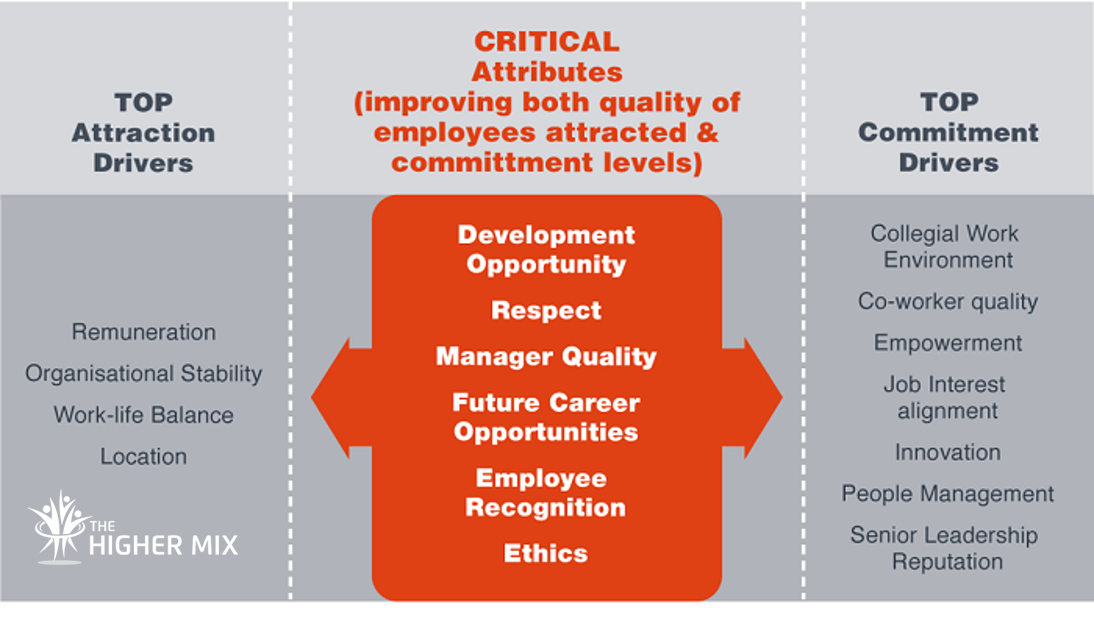
Studies confirm a culture of career growth, innovation, challenging work, pay for performance and a values-driven organisation are fundamental EVP attributes workers do look for in ideal employer – but will these work for you?
When an employer brand is crafted properly, it considers very carefully how it is that organisation wants to uniquely symbolise its own sets of values and promises.
Question remains, whether your internal teams actually have the necessary skills to apply a plethora of knowledge gained, and context of just how your company is viewed/ respected as an employer/service provider? Because at this point in the exercise it certainly does require strong conceptual abilities from your team, across multi-discipline group environments.
Steering teams with the skills and ability to comprehend what & where the real value resides (great many elements your company has on offer.) Choice of what to market, why and where, as important – because sum total of wonderful attributes about a company can’t all be promoted at once.
Yet another important consideration. To avoid real potential of derailment of any EB exercise; be sure to get execs and steering group collectively to a point where they can reach consensus; and agree upon formalised EVP territories/ attributes/ resulting EVP statements.
Easier said than done.
Employer Brand Strategy
Following confirmation of an authentic, deliverable EVP – employer brand strategy determines how, where to best market the value proposition effectively; definitive set of steps and actions organisations take to enhance their brand, strengthen appeal as an employer and build on relationships with existing or potential talent and/or external stakeholders.
Whether the objective is a fresh approach to talent recruitment & development, or transforming to be more customer-centric, achieve closer team/client relationships – all outcomes achievable from employer branding and specifically addressed as we develop EVP strategy.
Does your organisation have an employer brand strategy? Ask – is it resonating?
Creating a real connection with qualified, interested talent in and out of our business? Driving advocacy inside the company? [thrive_link color=’purple’ link=’mailto:jo@thehighermix.com’ target=’_self’ size=’small’ align=’right’]Click to Contact our Employer Brand Specialists[/thrive_link]
Culture Underpins Employer Brand
Culture has a huge stake in Employer Branding. Brand position, customer loyalty and shareholder value depend intimately on a company’s ability to deliver quality, consistent team and customer experiences. No surprises then, employer branding remains another avenue you have to improve organisational culture.
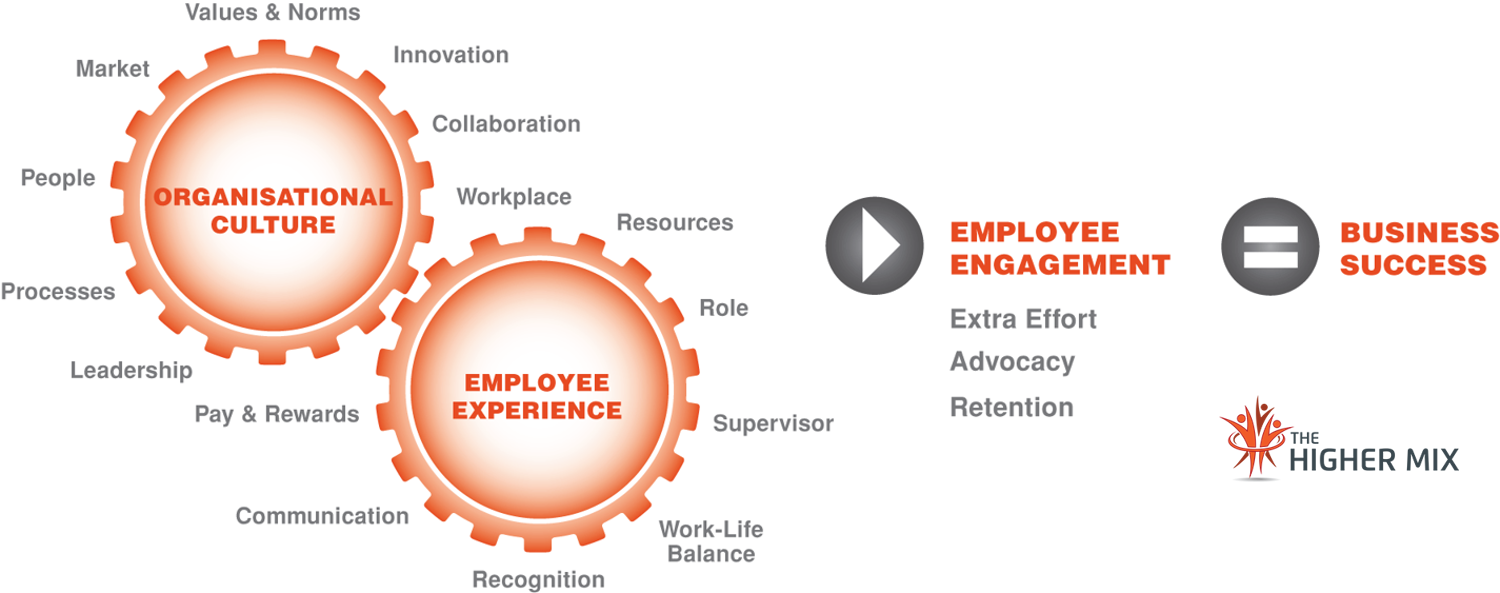
Great companies extol their competitive advantage/ differentiation as hailing from their own people – even as we all work hard to elevate and evolve our cultures – still all about what people feel and believe is valued. Attitudes, behaviours, skills characterising the entire organisation. That people do to ‘fit in’, are accepted, recognized, developed, rewarded and so on. We see first hand just how intimately culture connects into (impacts on) delivery of an EVP?
6. Claims test your EVP for Authenticity
Before marketing an employer brand – it is best to pilot it. Claims-testing your EVP makes certain an organisation is about to communicate a real (authentic) experience; over just one their steering team might think or assume is the case.
Claims-testing prior to activating a brand provides openings to expose it to fresh eyes. To put it through their lens, and tweak to validate so you can be sure that it stacks up – against competitors and will do the job to appeal broadly to local (and global) markets.
7. Embed, Internalize for an Aligned EVP
Constructive behaviours from internal teams remains most effective way to deliver on business strategy. Best practice Employer Branding connects organisational values, heads and hearts of your people, human capital strategy and HR practices/policies.
As implementation of EVP nears, aligning and internalising an EVP becomes crucial.
Over this phase, strategy and planning are activated: Systems | Process | Practices | Technologies | Touchpoints | Behavioural Alignment (messages aligned to employee attitudes & action) all these are addressed as we integrate/ embed EVPs into businesses.
Anchor your the EVP with Leaders too, through the EVP alignment phase. We help organisation understands the implications, act on evidence previously presented in the discovery phase, to alter what is impacting both employee experience and candidate experience.
As with any type of implementation planning – continually understanding where things are at and actively addressing the gaps and roadblocks.
8. EVP Communications: Strategy and Engagement
Communications strategy ensures employers brand lays out foundations for a culture chock-full of brand ambassadors and influencers – in and out of your organisation. Planning and execution so rubber hits the road. Move to the launch of EVP: omni-channel and omni-device (digital and workplace communications.)
Employee EVP education and orientation also key to successful EVP implementation. Just as important as how the company goes about communicating its EVP externally – probably more so, if it wants far more brand ambassadors.
9. Optimise and Measure EVP
Lastly, a continual eye on optimising, measuring of EVP; with key metrics in place to measure specific components to your employer brand strategy.
Get more out of your Employer Brand Journey
We trust you found familiarising yourself with our methodology and IP on Employer branding useful – and wish you well, in your quest to attract, develop, retain great talent inside your organisation.
In closing out, as employer brand experts; we leave you with a few of the most helpful hints to get you moving in the right direction:
- Ensure your company has documented, up-dated employee value proposition; that has been, or is about to be internalised with your people.
- Define organizational responsibilities and a budget for employer brand initiatives (top companies now get this – the importance and criticality to protecting their futures.
- Dedicate time to process of EVP development esp. engagement, internalisation phases. Typically they are going to run timeline of between 4-6 months; done well. Even out to more than 12+ months for sizable organizations – doesn’t happen overnight.
- Firm focus on delivering value to current employees; their empowerment and development.
- High-level executive buy-in (incl. line managers) makes the process strategic – the only way forward. Likewise, foresight to arm your own employees with a direct role in promoting the company’s employer brand.
- Include them in an EB process: Representative sample of different functions of the workforce, steering team is a mix of high performers | A/B plus players who can, will meet employer brand activities schedule / commitments. Select diverse group of people – by gender, ethnicity, age, tenure, location, function and/or by level.
- Lastly, confidentiality and high-trust also key considerations because of how you need to treat raw (and often highly-sensitive) data – it demands openness, integrity and aligned trust from your steering team.
Beware all the Employer Branding Pitfalls
Potentially there are countless pitfalls, so let’s address three of ones we encounter regularly.
Brand Vanilla.
Accounting for all the input, opinions, perspectives shared throughout this process – no surprises for those organisations who took a stab at building their own employer brands, regularly find themselves rooted in the ‘safe zone’; with a brand so dumbed down as a result of trying to reach consensus. When the EVP product arrives, no longer reflects their organization’s most valuable cultural attributes or employment experience. Tends to look and sound just like any other industry competitor.
And as employer brand specialists – we see this a lot….
Overpromise & Underdeliver.
There can be no disjoint. As employers, there are a whole stack of qualities we’d love our companies to be, but just aren’t. Any claiming of what’s not part of the brand-employment experience is completely off the table. True to others, True to self will protect brand authenticity over the longer term.
EVP product entirely “Creative” (lacks structure and form)
Often, we’re called in to reorientate organizations who have ended up with a lack-luster EVP product: deficient in clarity, with messaging like all the competitors; and so, very little traction, or inability to overcome that stereotypical positioning. Either that or it has been sanitized beyond measure.) Most times – skew happened internally as people were far too focused on delivering ‘creative’ assets, and not enough on the employer brand strategy behind it.
This is your opportunity to get this process right. To be strategic about it and enlist the help and support your internal teams need.
Wishing you the very best with your venture.

